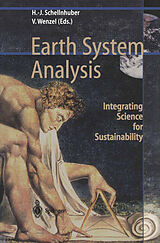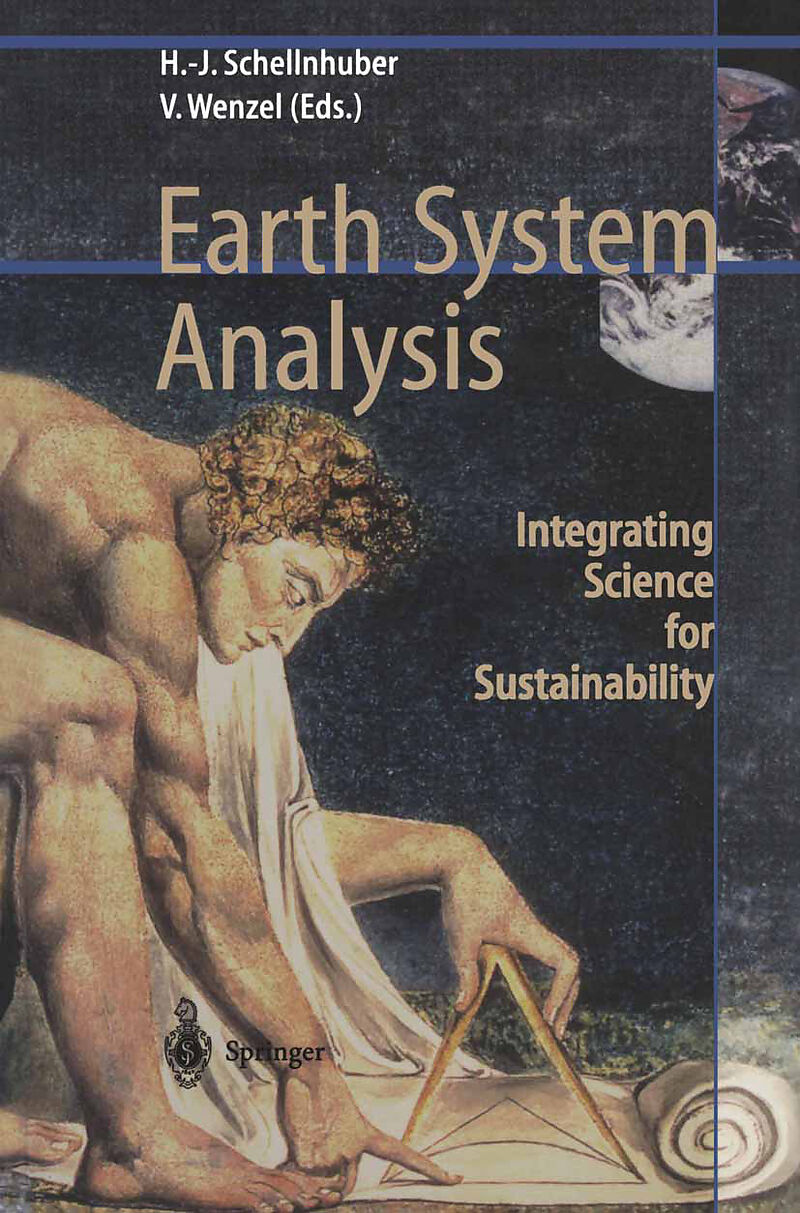Earth System Analysis
Format:
E-Book (pdf)
EAN:
9783642523540
Untertitel:
Integrating Science for Sustainability
Genre:
Wirtschaft
Herausgeber:
Springer Berlin Heidelberg
Anzahl Seiten:
530
Erscheinungsdatum:
06.12.2012
As humanity approaches the 3rd millennium, the sustainability of our present way of life becomes more and more questionable. New paradigms for the long-term coevolution of nature and civilization are urgently needed in order to avoid intolerable and irreversible modifications of our planetary environment. Earth System Analysis is a new scientific enterprise that tries to perceive the earth as a whole, a unique system which is to be analyzed with methods ranging from nonlinear dynamics to macroeconomic modelling. This book, resulting from an international symposium organized by the Potsdam Institute, has 2 aims: first, to integrate contributions from leading researchers and scholars from around the world to provide a multifaceted perspective of what Earth System Analysis is all about, and second, to outline the scope of the scientific challenge and elaborate the general formalism for a well-defined transdisciplinary discourse on this most fascinating issue.
Klappentext
Since this new science is of an unprecedented interdisciplinary nature, the book does not merely take stock of its numerous ingredients, but also delivers their multifaceted integration.
The resulting master paradigm - the co-evolution of nature and anthroposphere within a geo-cybernetic continuum of processes - is based on a structured manifold of partial paradigms with their specific ranges. Most importantly, this serves the scientific foundation of a meaningful, safe and efficient environment and development management for solving the most burning questions concerning humankind and its natural environment.
The more concrete elucidation of the natural and human dimensions, as well as various attempts and instruments of integration are represented in the different parts of the book, while the didactic quality is heightened by many allegoric illustrations.
Inhalt
1. Earth System Analysis - The Concept.- Discourse: Earth System Analysis - The Scope of the Challenge.- 1 Prologue.- 2 Global Change: Quantity Turns into Quality.- 3 Global Environmental Management: The Physics and the Metaphysics.- 4 Sustainable Development: One + Four Paradigms.- 4.1 Standardization.- 4.2 Optimization.- 4.3 Pessimization.- 4.4 Equitization.- 4.5 Stabilization.- 4.5.1 Generalized Equilibria.- 4.5.2 Passage to Equilibrium.- 4.5.3 Quality of Passage.- 4.6 Complex Paradigms.- 5 Integrated Modelling: Exploring Virtual Planetary Futures.- 5.1 Integration and Integrity.- 5.2 Playing the Game.- 5.3 Orientators and Indicators: From Virtual to Real Reality.- 6 Fuzzy Control: Soft Decision Making under Uncertainty or A Tale of Two Demons.- 6.1 The Teleological Dream: Laplace's Demon and Contemporary Company.- 6.2 Newton's Root-Finding Method - a Paradigm for Fuzzy Control.- 6.3 Coping with Uncertainty: Grand Entrance of Maxwell's Demon.- 6.4 Fuzzy Control and Geo-Cybernetics.- 7 Epilogue.- Commentary: Earth System Analysis - Explorations in a Research Frontier.- 1 Orientation.- 2 Substance.- 2.1 The human factor.- 2.2 The social dilemma.- 2.3 Contingency strategies.- 3 Concluding remarks.- Commentary: Surprises in the Climate Change Course.- 1 Introduction.- 2 The Caspian Sea case.- 3 Modelling activities.- 4 Conclusions.- Commentary: Sustainable Development - Teleology and Ambiguity.- 1 Introductory remarks.- 2 Semantic consideration.- 3 The role of values.- 4 Incompleteness.- 5 Standardization paradigm.- 6 Concluding remarks.- 2. Natural Dimensions.- 1: Ecology and the Earth System.- 1 Introduction.- 2 Why global models?.- 3 Can ecology meet the challenge?.- 4 The tools of global ecological modelling.- 5 Patterns in the biosphere.- 6 Primary production and optimality.- 7 Equilibrium and transient responses.- 8 The validation problem.- 9 The uses of palaeodata.- 10 Conclusions.- 11 Acknowledgments.- Commentary on "Ecology and the Earth System".- 1 Introduction.- 2 Boundary conditions for modelling the biosphere and the global carbon cycle.- 3 Feedbacks and time delays in dynamic systems.- 4 Vegetation models and climate.- 5 Dynamic vegetation models.- 6 Outlook.- Commentary: Eco-System Modelling and the Social Sciences.- 1 Introductory remarks.- 2 Global Change: an age old process.- 3 Origins of agriculture and links between climate change and human activities.- 4 Interdependencies between forms of social organization and the environment.- 5 Common vs. private property rights.- 6 The resulting research agenda.- 2: Climate Change and Land Use: Global and Regional Analyses.- 1 Introduction.- 2 Effects on regional competitiveness and global prices.- 2.1 Modelling effects on crop yields.- 2.2 Modelling effects on food supply and prices, worldwide.- 2.3 Assumptions about the future.- 2.4 Altered potential cereal production and food prices.- 2.5 Effects on regional - level land use.- 2.6 The Land Use Classification System (Lcs).- 2.7 The Climate Land Use Allocation Model.- 2.8 Effects of climate change on agricultural potential in England and Wales.- 2.9 Land use in England and Wales in a future without climate change.- 2.10 Effects of climate changes on land use in England and Wales.- 3 Conclusion.- Commentary: On the Inconsistency at the Interface of Climate Impact Studies and Global Climate Simulations.- 1 Introductory remarks.- 2 The problem of spatial scales.- 3 The problem of climate variability.- 4 Summary.- 3: Sustainable Development in Agricultural Landscapes.- 1 Introduction.- 2 The principle of sustainability in a cultural landscape.- 3 The role of agricultural landscapes within cultural landscapes.- 4 The application of mathematical models in research of agroecosystems.- Commentary on "Sustainable Development in Agricultural Landscapes".- 1 Introductory remarks on sustainable development.- 2 Profit oriented versus ecological oriented behaviour.- 3 Main environmental problems in agriculture and their causes.- 4 Main elements for a market oriented environmental policy in agriculture.- 5 Some more general remarks on research and policy.- 6 Linking natural science with economic models.- Commentary: Towards a Socially Accepted, Sustainable Management of Agricultural Landscapes.- 1 Introductory remarks.- 2 Are models of the physical system sufficient to ensure sustainable land use?.- 3 What documents are necessary to assess risk perception patterns of practitioners and lays?.- 4 Conclusions.- 3. Human Dimensions.- 1: Modelling Global Environmental Change: Improving Human Dimensions Components.- 1 Introduction.- 2 Modelling in current global environmental change research.- 3 Modelling in the social sciences.- 4 The necessity of following a modular approach.- 5 Can institutional effects be included?.- 6 Conclusion.- 2: Internationally Tradeable Emission Certificates - Efficiency and Equity in Linking Environmental Protection with Economic Development.- 1 Introduction: the idea and its political context.- 2 Theoretical context.- 2.1 International emission charges.- 2.2 Joint implementation.- 2.3 Internationally tradeable emission certificates.- 3 From theory to practice.- 3.1 Market organization.- 3.2 Rules of procedure.- 3.3 Allocation of certificates.- 4 Conclusions.- 4.1 Acknowledgements.- Commentary: Criteria for an Equitable Distribution of Internationally Tradeable Emission Certificates.- 1 Introductory remarks.- 2 Structuring the equity issues of climate change.- 3 An axiomatic approach to equity.- 4 Outlook.- 3: New Models of Wealth.- 1 Introduction.- 2 Interdependence between prosperity and ecology.- 3 New model of wealth.- 4 Costs and quantities.- 5 "Factor Four".- Commentary on "New Models of Wealth".- 1 Introductory remarks.- 2 Two questions.- 3 Categories of threats.- 4 Global vs. regional "logics".- 5 Synergetic approach for research and management.- 6 The possible role of a global model.- 7 Concluding remarks.- Commentary on "New Models of Wealth".- 1 Introductory remarks.- 2 Ecological taxes.- 3 Energy efficiency in Hungary.- 4 Accelerate…

Leider konnten wir für diesen Artikel keine Preise ermitteln ...
billigbuch.ch sucht jetzt für Sie die besten Angebote ...
Die aktuellen Verkaufspreise von 3 Onlineshops werden in Realtime abgefragt.
Sie können das gewünschte Produkt anschliessend direkt beim Anbieter Ihrer Wahl bestellen.
Loading...
Die aktuellen Verkaufspreise von 3 Onlineshops werden in Realtime abgefragt.
Sie können das gewünschte Produkt anschliessend direkt beim Anbieter Ihrer Wahl bestellen.
| # | Onlineshop | Preis CHF | Versand CHF | Total CHF | ||
|---|---|---|---|---|---|---|
| 1 | Seller | 0.00 | 0.00 | 0.00 |
